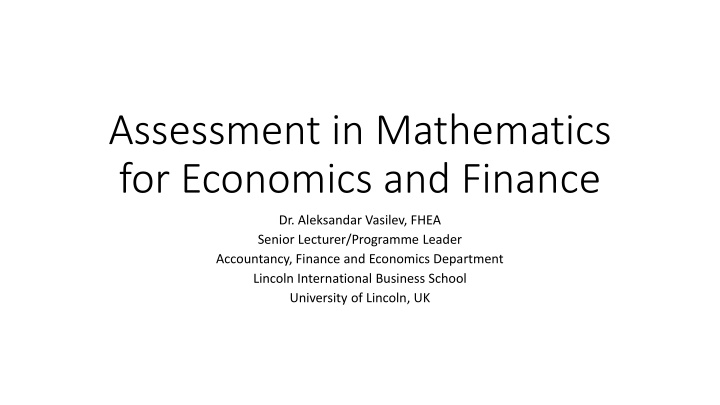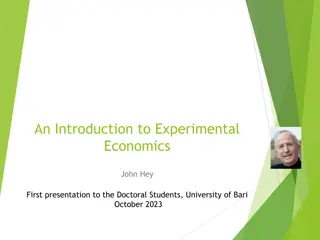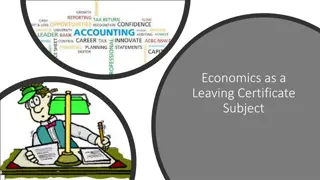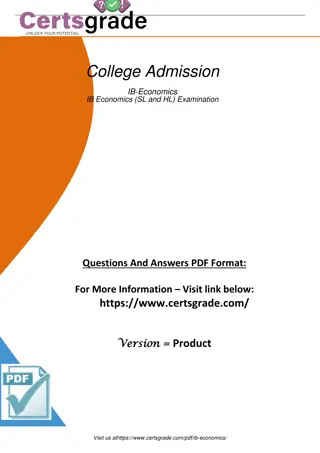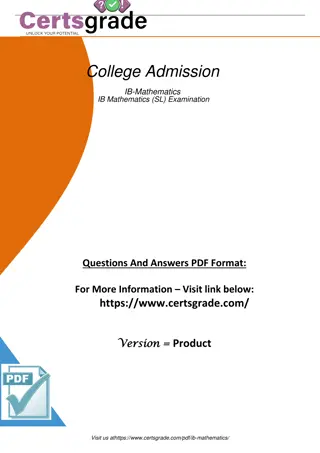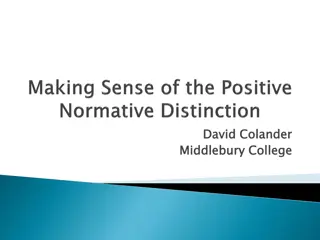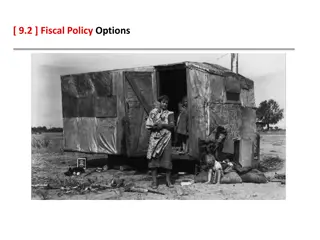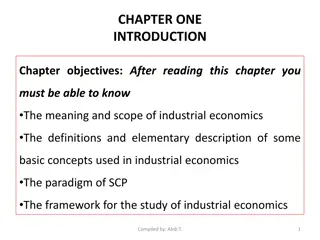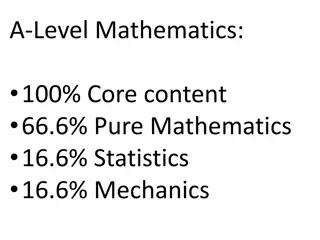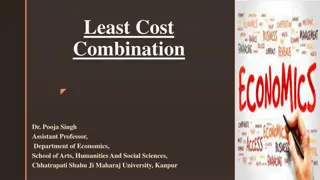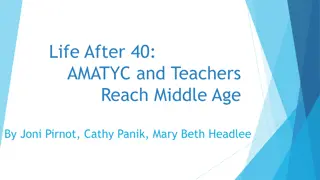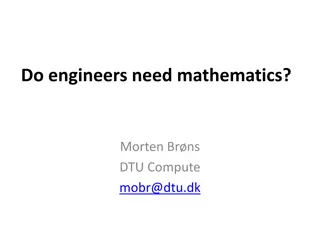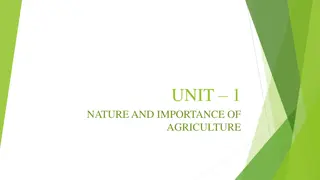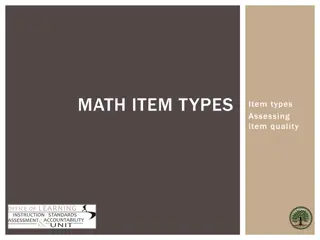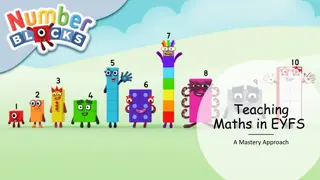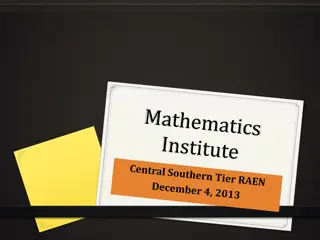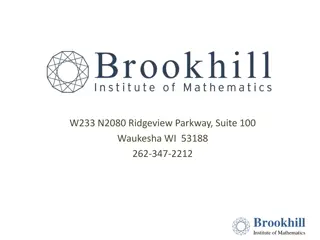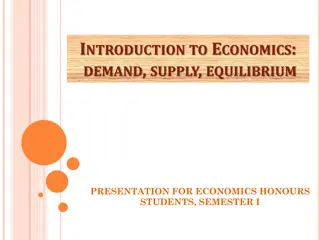Assessing Mathematics for Economics: Teaching Experience and Strategies
Teaching experience in Mathematics for Economics and Finance, covering advanced topics in Quantitative Methods. Utilizes examples from economics to enhance learning. Highlights challenges of tactical vs. strategic math skills in student learning.
Download Presentation

Please find below an Image/Link to download the presentation.
The content on the website is provided AS IS for your information and personal use only. It may not be sold, licensed, or shared on other websites without obtaining consent from the author.If you encounter any issues during the download, it is possible that the publisher has removed the file from their server.
You are allowed to download the files provided on this website for personal or commercial use, subject to the condition that they are used lawfully. All files are the property of their respective owners.
The content on the website is provided AS IS for your information and personal use only. It may not be sold, licensed, or shared on other websites without obtaining consent from the author.
E N D
Presentation Transcript
Assessment in Mathematics for Economics and Finance Dr. Aleksandar Vasilev, FHEA Senior Lecturer/Programme Leader Accountancy, Finance and Economics Department Lincoln International Business School University of Lincoln, UK
My experience Teaching and assessing one-semester Quantitative Methods in Economics at the American University in Bulgaria (AUBG), a US-type 4-year undergraduate programme based on Chiang and Wainwright s Fundamental methods in Economics Taught to second/third year Economics students who in addition to Principles, and some second-year electives, have already taken a semester in Linear Algebra, and a semester on Calculus I was able to cover the more advanced topics (and even finish with optimal control), as students have sufficient maths and economics knowledge. I utilized some examples from economics, and fed forward to Intermediate Microeconomics, and Intermediate (and Advanced) Macroeconomics At AUBG, Intermediate Microeconomics is more mathematical, while Intermediate Macroeconomics uses mostly the static IS-LM, and is thus essentially non-mathematical
My Experience - 2 As of 2019, I am regularly teaching a 2-semester module ECO 1002: Mathematics for Economics and Finance to Y1 BSc Economics (Honours) and BSc Economics and Finance (Honours) at the University of Lincoln (UoL). Students may have A-level maths, but it is not obligatory Students take concurrently 2-semester Principles sequence, and 2- semester Statistics sequence in their Y1 at UoL. The module begins with review of arithmetic and algebraic operations, then functions, to proceed with simple mathematical analysis on functions using differential calculus
My Experience - 3 Semester A ends with some simple integration finding inti- derivatives, and areas under curves (consumer and producer surplus) The main textbook used is by Jacques (Pearson) chosen because of the many exercises provided for students to solve this is the expected level of problems to show in the final exam (in both semesters A and B) Secondary readings are Thomas for those who find Jacques too challenging, and Chiang and Wainwright for those students that are more ambitious Semester B continues with the rest of Jacques, and includes simplified Kuhn-Tucker setups from Chiang, and some comparative-statics
tactical vs strategic maths skills Students are interested in getting a high mark passing with flying colours and then move on and forget everything This type of learning ( cramming formulae ) leads to overload in the short- term memory but this is tactically optimal from individual student perspective If you do not do calculus in a week, you start to forget We need students to be able to go through the problem even if they forgot a particular formula/technique double-checking, understanding the logic of the technique is important. A problem that does not have a solution is a good example to test deep analytical thinking Some question on an exam asking to (quickly/simply) model something mathematics is a modelling tool used in economics after all
tactical vs strategic maths skills - 2 At Lincoln, my assessment covers the whole range problems are relatively short and straightforward, as the primary aim is to demonstrate that a technique has been mastered. Topics are in chronological order students start with simple problems, and move further, thus building confidence and engaging with the exam. More advanced topics (Lagrangians, etc) have a higher weight, though which allows for a nice distribution of marks to reflect different level of performance. For deep applications, I assign a week in advance some more challenging end-of-chapter problems from Chiang et al., and we discuss those at the weekly seminars. Obviously, those problems are not suitable for a 2-hour exam Still, their usefulness is to develop more strategic maths skills that would serve them in Y2 in Intermediate- and Y3 Advanced-level theory modules (and beyond). The correlation between students who do well on the deep questions vs the students who do well on the standard textbook problems may not be perfect. But the former are more likely to do better in the long run, as they have obtained a deeper understanding of the material. Those students would eventually be the best candidates for PGR track.
tactical vs strategic maths skills - 3 A student even used some of those techniques to evaluate the effect of the sugar tax in the UK. To practice for the exam in term A, I distribute a mock exam, and we discuss it during last week s lecture. In term B, I directly refer students to Jacques, which also contains answers to the problems and if the student needs more guidance, we discuss There is some synergy with the other Economics modules mathematical techniques covered in Term A are aligned with topics from Micro Principles, while the techniques from Term B are somewhat aligned with Macro Principles (discussion of comparative- static effects in the Keynesian/IS-LM model)
The Situation at Lincoln Maybe a third of the students do not make it successfully through ECO 1002 (in the case when a student fails maths, but does well in stats, we offer the student to transfer to our BA Business Economics Programme, which is less mathematical, but still requires knowledge of stats and econometrics) The real assessment of maths in economics is actually how well the student does in Y2 and Y3 - when marks do matter for the final degree classification (ECO 1002 aims to provide a strong fundament in further PGT/PGR studies) Conditional on passing Y1 Maths, and Stats the drop-out rate in Y2 and Y3 is very low; students who survived Y1, do quite well in Y2 and Y3. We interpret this as a sign that we successfully weeded out the students who were not up to the UoL standards (those students would not have passed Y2 and Y3 Theory and Econometrics sequences anyway) Some students have been placed in (and successful graduated from) MSc Economics Programmes at St. Andrews, LSE, UCL. Others started work at the Treasury, ONS, etc.
